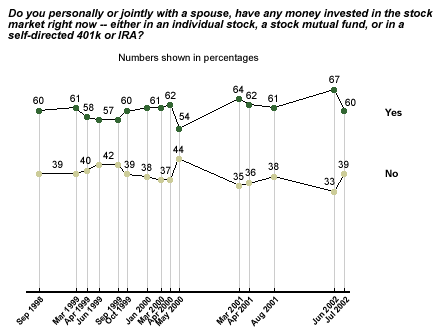As the stock market plunges, many on Wall Street talk somewhat matter-of-factly about the trillions of dollars that investors have lost not only in the last few years, but also in just the past couple of quarters. Of course, many wealthy investors have lost a great deal of money, and their daily lives may not be significantly impacted by their paper gains and losses.
But a huge number of average Americans also own stock today. In a July 5-8 Gallup Poll*, six out of 10 Americans said that they still have money invested in the stock market. This is down from 67% in June, but about equal to the average percentage of Americans owning stock over the past several years.

For many of these people, the losses in the stock market have significantly impacted their daily lives. For some, this impact is manifested by the so-called "wealth effect." Because they feel less wealthy, many Americans experiencing losses tend to spend less money for some period of time after the market turns down, or vice versa. Federal Reserve Board Chairman Alan Greenspan even noted this impact on potential consumer spending in his recent testimony before Congress. (He also noted that he felt the economic impact of this wealth loss is being offset by the benefits associated with the new opportunity for many Americans to refinance.)
Retirement Impact
Less frequently discussed, however, is the longer-term impact of today's stock market losses on when and under what conditions many Americans will retire. Right now, two out of three Americans say they have money saved for retirement in a 401k, IRA or some other type of investment. As a result, Americans -- baby boomers in particular -- will probably feel the impact of the declining stock values most significantly during their retirement years, because they do not have enough working years remaining to regain the savings they have recently lost in the market.
Currently, more than half (52%) of those Americans owning stocks say they lost money over the past year. Therefore, it is not surprising that 31% say they have less money invested in the stock market.
Nor is it surprising that these losses are affecting many Americans' retirement plans. Nearly half (46%) of today's working adults say that the decline of the stock market in recent years means that they will retire later than they expected previously. Worse yet, almost as many (44%) say they think they will live less comfortably in retirement because of their losses in the market.
The Blame Game
So, who is to blame for the fact that many Americans will have to work longer and enjoy their retirement less? If you ask those on Wall Street, they'll say that Americans should blame themselves: Americans should have known that there are risks associated with investing in the stock market. They received great gains in the late 1990s; so now they are experiencing some losses. If they had been smarter and/or more risk averse, they could have put their money in real estate or even bank certificates of deposit.
Most stockholders, however, feel they are not to blame. More than half (54%) of all stockholders say they think they have done a good or excellent job of managing the investments in their retirement portfolios. Instead, they blame those who have tainted the market. Fifty-two percent of Americans say they think the stock market unfairly benefits the rich. And, 69% say they now rely more on their own judgment and less on the advice of market professionals.
*Results are based on telephone interviews with 1,013 national adults, aged 18 and older, conducted July 5-8, 2002. For results based on the total sample of investors, one can say with 95% confidence that the margin of sampling error is ±3 %. For results based on the sample of --663-- stockowners, the maximum margin of sampling error is ±4%. For results based on the sample of 572 non-retired adults with retirement savings, the maximum margin of sampling error is ±5%.

